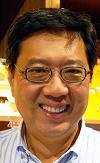
The look of Eu Yan Sang outlets today.

And what an outlet looked like in the past.
FOR MANY years – nay, decades – Eu Yan Sang had only a handful of outlets in Malaysia and one in Singapore. Stagnant growth, in other words.
When it opened a new store in 1991, it was the first new opening since World War II, which was about 50 years earlier.
With this outlet in Petaling Jaya, Eu Yan Sang now had a grand total of seven outlets – that is, one in Singapore and six in the Malaysian towns of Penang, Ipoh, Kampar, Kuala Lumpur, Seremban and Petaling Jaya.
Then in 1989, Richard Eu, the current CEO, stepped into the picture. After stints in investment management and other jobs, he became Group General Manager of Eu Yan Sang Holdings Ltd, the owner of the Eu Yan Sang business in Singapore and Malaysia.
In 1993, Richard organised a management buyout of the business.
In 1996, the business was merged with the Eu Yan Sang business in Hong Kong, which had three outlets at that time, thus forming the Eu Yan Sang International Group of today.

Outlets as of the start of 2009

More and more outlets & clinics after 2000

Richard Eu, CEO, Eu Yan Sang Group
“The pace of expansion slowly picked up after management learnt how to go about opening new outlets,” says Richard.
“We have grown the number of new outlets by about 10% a year. If at one point, it was four to five new outlets, now it’s 10 to 14 outlets.”
Today, Eu Yan Sang has 59 outlets in Malaysia, 45 in Hong Kong and 38 in Singapore. In all, including the new markets of China, Taiwan and Macau, the Group has 152 outlets – and an ambition to keep opening new outlets.
The outlets are operated by Eu Yan Sang as it does not subscribe to the franchise model. The pace of expansion takes into account the high level of product knowledge that the staff had to acquire.
“We are a specialist retailer, not a generalist retailer selling stuff like toothpaste,” says Richard.
Eu Yan Sang markets hundreds of products, and Richard says it intends to boost its offering of health supplements and tonic food while maintaining its range of medicinal products.

Modern packaging: One of Eu Yan Sang's best-selling products, the Bak Foong Pills.

Packaging that belongs to a different era.
Eu Yan Sang products can be found at hypermarkets, supermarkets, drug stores, medical halls, convenience stores and selected polyclinics. They are also available at thousands of outlets worldwide, including over 60 hospitals and more than 19,000 drug stores in China, as well as selected retail outlets in Australia and USA.
The age profile of customers is getting younger, says Richard. From the 40-50 age group about a decade ago, the biggest group of customers now falls into the 25-40 range.
They have been won over by Eu Yan Sang's “modernized” product offerings. It started selling ginseng tea in tea bags, so it’s convenient to consume. It introduced herbs in packets ready to be cooked as soup.

How the logo has been transformed from 1999!
Product packaging changed too, as did the store layout and design. The logo changed. And, of course, Eu Yan Sang opened outlets in shopping centers, which are largely patronized by younger people.
These changes and the opening of new outlets have led to revenue and profit growth, as Eu Yan Sang won market share from its competitors.
Previous article: EU YAN SANG: Its biggest and oldest outlets







